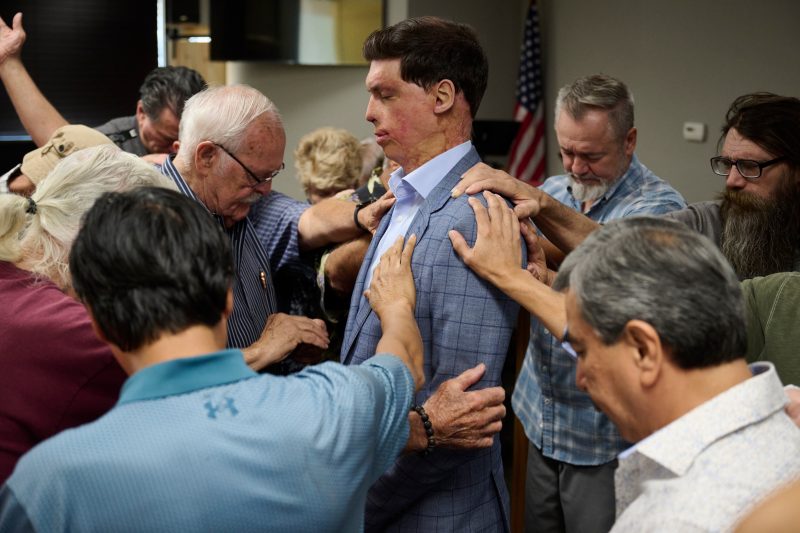SPARKS, Nev. — Ed Lawson, the longtime mayor of this small desert city of about 110,000 just outside Reno, said he has never voted for a Democrat. That will change next month when he plans to vote for Sen. Jacky Rosen (D) over her Republican challenger, Sam Brown.
“Sam Brown doesn’t get it,” Lawson said in an interview. “He certainly hasn’t ever come talk to us and ask us what we need in Sparks.”
Brown, a military veteran and Purple Heart recipient, is the latest Republican trying to break the party’s dozen-year drought on winning a U.S. Senate race here. His campaign was considered a prime pickup opportunity for the GOP, which needs to win a net of two seats to reclaim the Senate majority.
But Brown has been unable to close the polling gap with Rosen, an incumbent with a well-funded campaign that Brown, who is neither independently wealthy nor a prolific fundraiser, has not matched. He has also failed to generate excitement among conservative voters, even in the more rural parts of the state where Republicans typically win overwhelmingly, with some citing his unfamiliarity with state issues. Brown’s staff recently turned over, a sign of turmoil in the campaign. And he has skipped basic campaign rituals, such as reaching out to local Republican leaders like Lawson.
Rosen, who’s still relatively new to politics after Sen. Harry M. Reid (D), who died in 2021, handpicked her to run for Senate in 2018 following a single House term representing parts of Las Vegas, is leading in public polling averages by 8.5 percentage points. Republican internal polling, according to people familiar with the standings who spoke on the condition of anonymity to discuss internal findings, shows Brown down by about 7 percentage points — a difficult gap to close with less than three weeks before Election Day.
Members of Brown’s campaign, who also spoke on the condition of anonymity, said the figure is closer to 5 percentage points and that he can make up the difference by getting former president Donald Trump’s supporters to vote for him. The campaign insists Brown still has a path to victory.
Democratic presidential candidates won Nevada in the last two elections, and Vice President Kamala Harris has a slight lead in the state over Trump. But Republicans have won statewide recently, electing a GOP governor in 2022.
Republicans working to win the Senate majority are taking stock of the Nevada race. With limited resources and Brown polling further behind than Republicans in other races, they are turning their attention to more competitive campaigns, including those in Michigan, Wisconsin and Ohio.
Brown is working to appeal to more Trump voters, like Kaci Capurro, who recently attended a Republican Women of Reno event to hear the Senate candidate speak. Capurro, a Reno resident who wore a Trump T-shirt to the event, said she’ll “of course” vote for Brown, citing his Christian values.
Brown will need to remain competitive in his county of Washoe to be victorious the state. Even with polls showing him trailing, Brown said in an interview that his campaign goal remains the same: “Regardless of where the polls are, what I’m doing in this campaign is … getting out and talking to folks face-to-face.”
His personal story is central to his candidacy. In 2008, Brown deployed to Afghanistan as a U.S. Army officer when his Humvee hit a roadside bomb. He suffered third-degree burns on nearly a third of his body, including his face, and underwent more than 30 surgeries during a three-year recovery.
It’s an experience he shares regularly during campaign stops. He found purpose in that moment of desperation, he said, and now, at his wife’s persuasion, wants “to serve others as [God] has called us to.”
Voters in Nevada say they’re moved by what happened to Brown on the battlefield but suggest it’s not enough to carry a campaign. George Taylor, a Republican from Reno, has knocked on hundreds of doors to persuade people to vote for Brown. Still, he said Brown relies too much on his biography and isn’t doing enough to aggressively push back against Rosen on issues related to the border or transgender women in sports.
“Don’t make this campaign about … background or nobility,” Taylor, 65, said. “He has a more interesting background than [Rosen] does, but that’s not what voters care about.”
Brown talks about Rosen and the border during his campaign events, blaming her for failing to address the issue as a member of the Senate Committee on Homeland Security. But Brown does not engage in aggressive personal attacks, and his mild-mannered demeanor is far from the bombastic style of Trump that some Republican voters now demand.
Nathan Robertson, a Republican and the mayor of Ely, a small town with about 4,000 residents in eastern Nevada, also plans to back Rosen. The senator always picks up the phone when he calls, he said, and visits the town every year despite Ely being extremely isolated, with the closest cities of Reno and Las Vegas each more than 200 miles away. Rosen has also helped secure federal funding for the small mining town, he said.
Robertson had not heard from Brown since he began running for Senate this cycle and he’s not convinced Brown understands enough about Nevadans’ challenges to represent them in Washington. Brown, who moved to the state in 2018 and lives in Reno, also ran for Senate in 2022, losing in the primary to fellow Republican Adam Laxalt. Eight years earlier, he lost a Republican primary in Texas for the state’s House of Representatives.
“Nevadans want to elect someone who they know knows their state, who knows their communities and who has some track record,” Robertson said.
Lawson, the Sparks mayor, dismissed the idea of facing political backlash for backing Rosen. He was one of six elected Republicans previously censured by the Washoe Republican Party for supporting candidates not on the party’s official endorsement list. He is most concerned about the lack of housing in his city, a crisis affecting the entire state that’s only expected to worsen as new Tesla and Google factories led to population growth. Lawson has worked closely with Rosen on legislation that would allow the state to use federal land for housing development.
“It’s our survival as a city, and Jacky gets it,” he said.
Washoe County, Nevada’s second-most-populous, is home to about 20 percent of the electorate. Aside from needing strong support there, Brown must also win overwhelmingly in rural towns like Ely. An August New York Times/Sienna College poll found that just 52 percent of voters in rural Nevada supported Brown, a huge gap from the 80 percent support Republican candidates usually win in rural Nevada.
“I may have missed somebody, but I’ve done a pretty broad reach out across electives across the state,” Brown said in response to a question about why he hadn’t contacted Lawson, adding: “sometimes, you know, [I] miss a phone call or whatever. But look, at the end of the day when I’m elected, everyone is going to have an open door.”
Two days later, Brown called Lawson and told him that if elected, he’d support the federal lands legislation that the Senate is considering.
Brown’s race started strong. He had the backing of the National Republican Senatorial Committee and, just ahead of the June primary when it became clear he would easily win the party’s nomination, he received an endorsement from Trump. He had a speaking role at the Republican National Convention in July where he talked about the injuries he received in Afghanistan.
Since then though, Republicans dramatically scaled back funding in the state as they shift resources toward closer races. The National Republican Senatorial Committee pulled about $7.4 million worth of ads before reinvesting about $1 million at a much cheaper advertising rate, which allows for more ads with less money, with future investments possible. NRSC spokesman Mike Berg said Nevada remains a top pickup opportunity for Republicans “and we will invest accordingly.”
One Nation, a political entity of the Senate Leadership Fund, the super PAC focused on getting Republicans elected to Congress, hasn’t spent money advertising in the race since the first week of September because they settled on races they think Republicans have a better shot at winning, including Michigan and Wisconsin.
Republicans working on congressional campaigns have fretted privately that the Trump campaign is not doing enough to contribute funds or voter contacts to help downballot GOP candidates. The Trump campaign did not immediately respond to questions about the Republicans’ concerns.
At the Republican Women of Reno event, Brown said Trump’s growing support among Latinos “opens a door for me, too.” But at a Latino Americans for Trump event in Las Vegas, the speakers made no mention of Brown. And in one of Trump’s offices in Las Vegas, Trump signs plaster the walls while the only indication that Brown is on the Nevada ballot were fliers on a small fold-up table in the back of the room.
Brown’s four-point policy platform is taken directly from Trump’s plans, including a “no taxes on tips” proposal and plans to eliminate taxes on Social Security benefits — issues that resonate with Nevada’s large service-industry workforce and growing retiree population. To pay for the estimated $1.6 trillion 10-year price tag associated with those programs, Brown offered no specifics but said he’d cut what he called reckless spending in Washington. He also said he’d work to finish the border wall, fix the immigration system, improve veterans’ health-care networks, and would oppose federal funding for abortion.
Abortion politics are playing a major role in Nevada, where voters will weigh a ballot initiative to add a right to the procedure to the state’s constitution. Nevada law allows abortions up until 24 weeks of pregnancy or to save the life of a mother after that point.
Rosen, in a TV ad, warns Brown will “take away your rights” and calls him a “MAGA extremist,” referring to Trump’s Make America Great Again slogan. Her campaign, along with the Democratic super PAC WinSenate, has spent at least $75 million on television, radio and digital ads in the state this cycle, according to media advertising tracking firm AdImpact.
Brown has been forced on his heels on the issue. He insists that he respects Nevada’s existing abortion law and, following Trump’s lead, said he would not support a national ban. He has talked openly about his wife having an abortion before they met, using it as a way to show that he understands women need to feel supported. But he refused to comment on the state’s abortion ballot initiative.
When asked if he would leave the initiative question blank on his ballot, he said, “I hadn’t even thought about that. That’s an interesting question. So thanks for giving me something to ponder.”
Bob Olson, a Trump supporter from Las Vegas who is also running for a state assembly seat, said Brown’s campaign has “no substance.”
“It like putting your finger through smoke,” he said. If he isn’t able to vote for “none of the above,” he’ll vote for Rosen, he said.
Brown has ramped up his campaigning since Labor Day, spending most of his time in Clark County, which includes Las Vegas, the most populous region of the state and home to at least 70 percent of voters.
Walking into a Walmart Supercenter in Reno on a recent morning at 7:30 a.m., Kathleen, 78, who spoke on the condition that her last name not be used to protect her privacy, said she had just worked a night shift at a casino because her monthly Social Security checks “aren’t enough” to live on. She was a lifelong Democrat but changed her voter registration to Republican because of Trump.
As for the Senate race? “I go for the gals,” she said, referring to Rosen and fellow Democratic Sen. Catherine Cortez Masto, who won reelection in 2022.
“They have proven themselves.”

